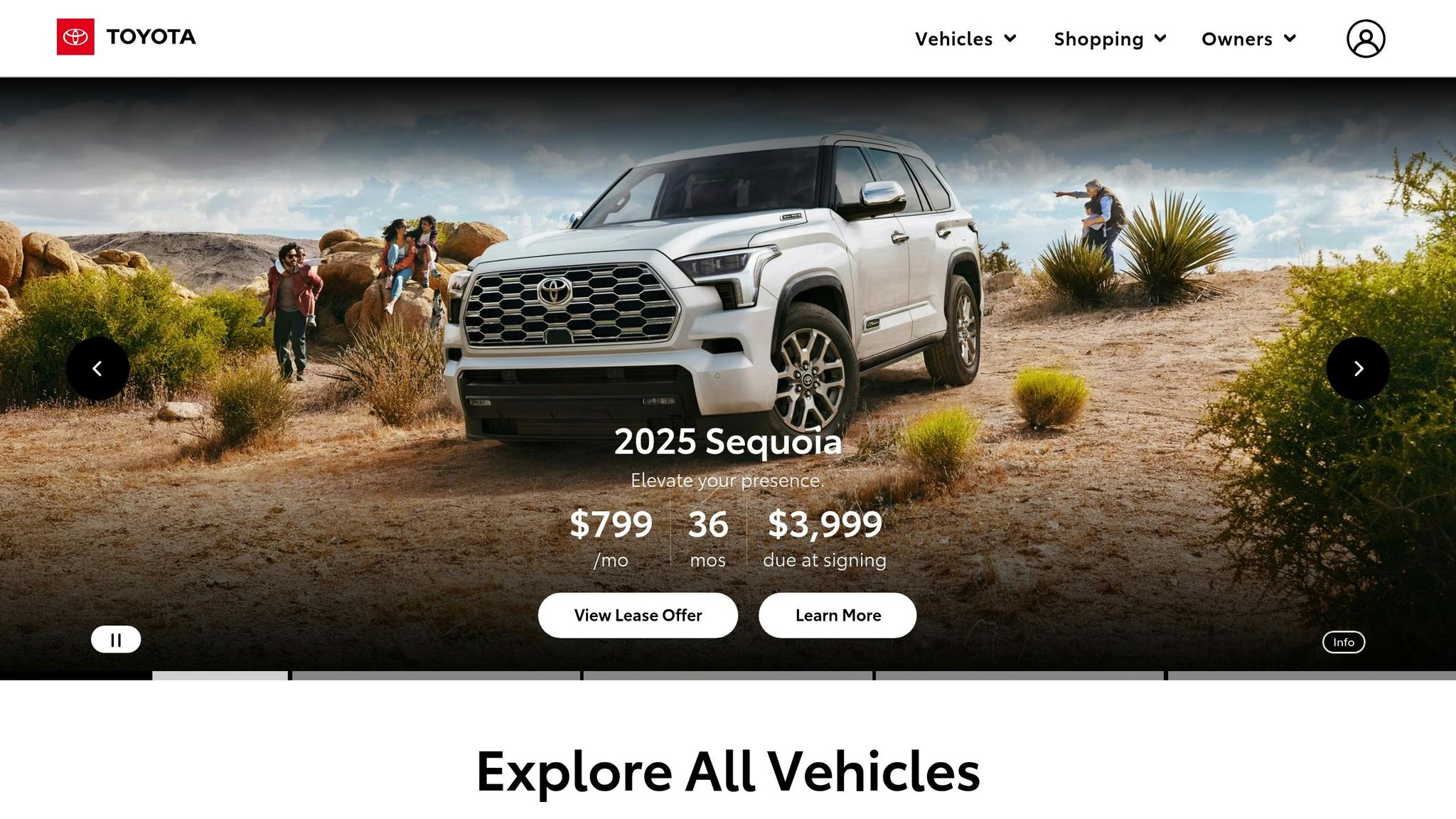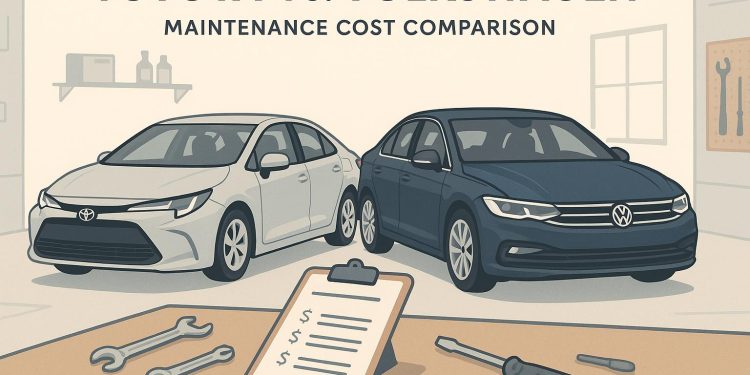Looking for a car with low maintenance costs? Here’s the bottom line: Toyota is generally more affordable to maintain than Volkswagen. Toyota’s simpler design means lower repair costs, widely available parts, and fewer issues over time. Volkswagen, while offering advanced features, often comes with higher service and repair expenses due to its complex systems and imported parts.
Quick Overview:
- Toyota: Lower costs for repairs, parts, and routine service. Strong parts availability and simpler maintenance.
- Volkswagen: Higher repair and parts costs, with more frequent and complex maintenance needs.
Quick Comparison Table:
| Cost Factor | Toyota | Volkswagen |
|---|---|---|
| Basic Service | Affordable | Higher due to specialized needs |
| Parts Availability | Widely available | Limited, often imported |
| Repair Costs | Lower, fewer issues | Higher, more frequent repairs |
| Aftermarket Parts | Many cost-effective options | Limited alternatives |
Key takeaway: If you’re budget-conscious, Toyota offers lower long-term costs. Volkswagen is ideal for those prioritizing advanced features and are prepared for higher upkeep expenses.
Why Is Volkswagen Maintenance Expensive? – Germany …

Regular Service Costs
Toyota and Volkswagen both require routine maintenance at scheduled intervals. While exact cost details aren’t provided, here’s an overview of each brand’s service approach.
Toyota Service Costs and Plans

Toyota vehicles are maintained through a regular service schedule designed to handle essential upkeep. The costs depend on the model and the specific services needed, all aimed at ensuring the vehicle runs smoothly over time.
Volkswagen Service Costs and Plans
Volkswagen vehicles also follow a planned maintenance schedule to address key service needs. Specific details about the intervals or included components for Volkswagen services aren’t available.
Repair Costs Over Time
As cars get older, repair costs can become a big part of what it takes to keep them on the road. When comparing Toyota and Volkswagen, Toyota vehicles generally cost less to fix over time. Here’s a closer look at how repair costs stack up for each brand.
Toyota Repair Costs
Toyota has built a reputation for reliability. Major repairs usually happen later in a Toyota’s lifespan, which means lower repair bills as the miles add up.
Volkswagen Repair Costs
Volkswagen vehicles, on the other hand, often need repairs earlier and more frequently. Their design can lead to repairs that are more expensive.
In short, Toyota vehicles tend to have lower repair costs over the long haul compared to Volkswagen.
sbb-itb-09752ea
Parts Cost and Availability
Toyota and Volkswagen show clear contrasts in replacement part costs and availability within the U.S. market.
Toyota Parts Market
Toyota offers a well-established and dependable parts network in the U.S. Thanks to its strong local manufacturing presence, parts are more affordable for American customers. Here’s a quick look at common Toyota part prices:
| Common Part | Toyota Price | Service Life |
|---|---|---|
| Air Filter | $24 | 12–15 months |
| Brake Pads | $64 | 30–35k miles |
| Timing Belt Kit | $149 | 60–75k miles |
Certified aftermarket options for Toyota parts are available at about 40% of the cost of original equipment manufacturer (OEM) parts. Additionally, Toyota’s Heritage Parts program supports 98% of models from 2000 onward, making long-term maintenance more accessible and affordable.
Volkswagen Parts Market
Volkswagen’s parts market presents higher costs and some availability hurdles. Since many parts are imported, they come with added duties and logistics fees, typically increasing prices by 12–15%. Here’s a breakdown of common Volkswagen part costs:
| Common Part | VW Price | Service Life |
|---|---|---|
| Air Filter | $33 | 12–15 months |
| Brake Pads | $96 | 30–35k miles |
| DSG Clutch Kit | $1,200 | 40–50k miles |
Volkswagen owners often deal with longer wait times, averaging 3–5 days for special orders. While third-party suppliers offer non-electronic parts at about 35% less than dealership prices, some components remain notably expensive due to specialized engineering. For example:
- The Touareg‘s air suspension system replacement struts cost $2,026.
- Golf R turbocharger replacements are priced at $1,467.
- Electronic parts often need to be purchased directly from dealerships to maintain warranty coverage.
Parts availability becomes a bigger issue for older Volkswagen models. Unlike Toyota, which supports nearly all models from the past 20 years, Volkswagen has discontinued support for about 40% of pre-2010 models. This often forces owners to rely on used parts or specialized suppliers.
Extra Maintenance Expenses
Owning a car long-term often means dealing with more than just routine services and repairs. Both Toyota and Volkswagen vehicles can come with extra costs stemming from wear-and-tear or unexpected fixes.
Key Maintenance Issues
Toyota cars tend to have maintenance needs that are fairly straightforward. Owners should plan for regular replacements like brake pads, tires, and batteries. Over time, parts like timing belts, suspension components, and catalytic converters may also need attention.
Volkswagen vehicles, on the other hand, often require more specialized care. Maintenance might include tasks like transmission fluid changes, turbocharger servicing, or recalibrating driver assistance systems. These advanced systems can make maintaining a Volkswagen more complex and expensive compared to Toyota.
Cost Comparison Summary
Here’s a quick breakdown of the cost differences between Toyota and Volkswagen. Toyota vehicles tend to have lower maintenance costs thanks to simpler mechanical designs, making basic services more affordable and boosting resale value. On the other hand, Volkswagen’s advanced European engineering often leads to higher costs due to complex systems and specialized repairs.
| Cost Factor | Toyota | Volkswagen |
|---|---|---|
| Basic Service | Generally more affordable | Higher due to specialized service needs |
| Parts Availability | Widely available | May be harder to find |
| Service Network | Extensive and easy to access | Often requires specialized centers |
| Labor & Repairs | Lower labor costs, fewer issues | Higher labor rates, more specialized work required |
| Aftermarket Parts | Many cost-effective options | Fewer competitive alternatives |
Toyota’s straightforward design means fewer repairs and lower costs, while Volkswagen’s advanced technology comes with higher expenses. For buyers watching their budget, Toyota is a practical choice, balancing affordable maintenance with strong resale value. Volkswagen, however, appeals to those who prioritize cutting-edge features and are prepared for higher upkeep costs.
To manage maintenance expenses effectively, consider these tips:
- Use authorized service centers for complex issues.
- Look into aftermarket parts for out-of-warranty repairs.
- Find a trusted mechanic who knows your car model well.
Choosing between Toyota and Volkswagen ultimately depends on your budget and what you value most in a vehicle.
FAQs
Why are Toyota cars typically less expensive to maintain than Volkswagen vehicles?
Toyota vehicles are often more affordable to maintain due to their reputation for reliability, simpler engineering, and widely available parts. Toyota’s focus on durability and straightforward designs helps reduce the frequency and cost of repairs over time. Additionally, Toyota’s global popularity ensures that replacement parts are more accessible and competitively priced.
Volkswagen vehicles, while known for their performance and advanced features, often have more complex engineering and may require specialized parts or services, which can increase maintenance costs. These factors make Toyota a more budget-friendly option for long-term ownership.
What common maintenance issues might Volkswagen owners experience more often than Toyota owners?
Volkswagen vehicles are known for their engineering precision, but they may require more frequent attention to specific components compared to Toyota. Common issues reported by Volkswagen owners include electrical system malfunctions, such as problems with sensors or control modules, and transmission issues, particularly with older DSG (dual-clutch) systems. Additionally, Volkswagens may experience carbon buildup in direct-injection engines, which can affect performance over time.
Toyota, on the other hand, is often praised for its reliability and lower maintenance needs. While no car is entirely free of issues, Toyota vehicles generally have fewer recurring problems, making them a popular choice for those seeking low-cost upkeep.
How does the availability of parts affect maintenance costs for Toyota and Volkswagen vehicles?
The availability of parts plays a significant role in determining the maintenance costs of Toyota and Volkswagen vehicles. Generally, Toyota is known for its widespread availability of affordable parts, which can help keep maintenance costs lower. Volkswagen parts, on the other hand, can sometimes be less accessible and more expensive, depending on the specific model and region.
When parts are readily available, repairs and maintenance tend to be quicker and more cost-effective. In contrast, limited availability of parts can lead to higher prices and longer wait times for repairs. This difference is something to consider when deciding between these two popular brands.
Related posts
- Top 5 Cars for South African Roads
- Most sold cars in Johannesburg
- Car maintenance costs in South Africa
- Top 10 Most Affordable Hybrid Cars in South Africa in 2025





